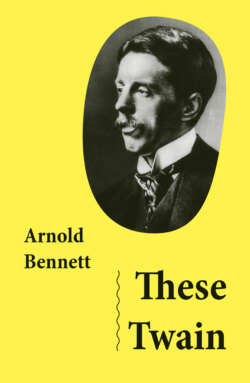Читать книгу These Twain (Unabridged) - Arnold Bennett - Страница 29
На сайте Литреса книга снята с продажи.
iii
ОглавлениеBut soon she became more serious. She had a delicious glow of seriousness. She overflowed with gratitude to Edwin. His good-nature was exquisite. He was not perfect. She could see all his faults just as plainly as when she was angry with him. But he was perfect in lovableness. She adored every aspect of him, every manifestation of his character. She felt her responsibility to him and to George. It was hers to bring grace into their lives. Without her, how miserable, how uncared for, those two would be! They would be like lost children. Nobody could do for them what she did. Money could not buy what she gave naturally, and mere invention could not devise it. She looked up to Edwin, but at the same time she was mysteriously above both him and George. She had a strange soft wisdom for them. It was agreeable, and it was proper, and it was even prudent, to be capricious on occasion and to win by pouting and wiles and seductions; but beneath all that lay the tremendous sternness of the wife’s duty, everlasting and intricate, a heavy obligation that demanded all her noblest powers for its fulfilment. She rose heroically to the thought of duty, conceiving it as she had never conceived it before. She desired intensely to be the most wonderful wife in the whole history of marriage. And she believed strongly in her capabilities.
She went upstairs to put on another and a finer dress; for since the disastrous sequel to the At Home she had somewhat wearied in the pursuit of elegance. She had thought: “What is the use of me putting myself to such a lot of trouble for a husband who is insensible enough to risk my welfare unnecessarily?” She was now ashamed of this backsliding. Ada was in the bedroom finicking with something on the dressing-table. Ada sprang to help as soon as she knew that her mistress had to go out. And she openly admired the new afternoon dress and seemed as pleased as though she was to wear it herself. And Ada buttoned her boots and found her gloves and her parasol, and remembered her purse and her bag and her handkerchief.
“I don’t quite know what time I shall be back, Ada.”
“No’m,” said Ada eagerly, as though saying: “Of course you don’t, m’m. You have many engagements. But no matter when you come back we shall be delighted to see you because the house is nothing without you.”
“Of course I shall be back for tea.”
“Oh, yes’m!” Ada agreed, as though saying: “Need you tell me that, m’m? I know you would never leave the master to have his tea alone.”
Hilda walked regally down the stairs and glanced round about her at the house, which belonged to Maggie and which Edwin had practically promised to buy. Yes, it was a fine house, a truly splendid abode. And it seemed all the finer because it was Maggie’s. Hilda had this regrettable human trait of overvaluing what was not hers and depreciating what was. It accounted in part, possibly, for her often very critical attitude towards Edwin. She passed out of the front-door in triumph, her head full of wise schemes and plots. But even then she was not sure whether she had destroyed—or could ever destroy, by no matter what arts!—the huge dangerous lithographic project.
As soon as she was gone, Ada ran yelling to the kitchen:
“Hooray! She’s safe.”
And both servants burst like infants into the garden, to disport themselves upon the swing.
